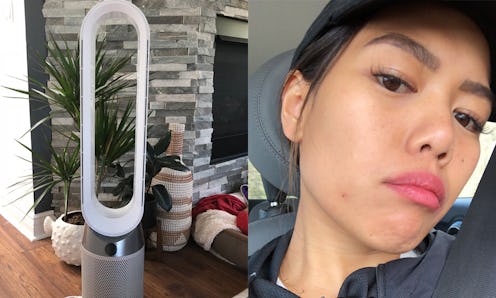
You've likely considered using an air purifier to ease your allergies, but the gadget can do more than just relieve your sinuses — using an air purifier might also affect the way your skin looks and feels. With the beauty industry's growing concerns about how air pollutants can cause serious damage to your skin, it should come as no surprise that an air purifier could be the next big beauty must-have to add to your list of tools and contraptions (right after a jade roller and a silk pillowcase). After using an air purifier for a month, it's become one of mine.
Recent studies have linked air pollution exposure to extrinsic skin aging signs, like pigment spots and wrinkles, as well as serious skin conditions, like eczema, psoriasis, atopic dermatitis, acne, and in some cases, skin cancer. Even if you live in the mountains or by the ocean or spend most of your time inside, you can still be affected by air pollution. While air pollution levels in many areas of the United States continues to exceed national air quality standards, what's more concerning are the effects of indoor air pollution on your health. According to estimates from the EPA, the air inside the average home may be as much as five times more polluted than the air outdoors — yikes!
While there hasn't been much research done in the United States linking indoor air pollution and skin damage, it's been a topic of discussion in China, where, until recently, air pollution was considered the worst in the world. A recent study conducted in China found that indoor air pollution was in fact linked to skin damage. Jessica Lee Dinh, an engineer at Dyson, elaborates.
"Most of the air we interact with is indoors where we spend 90 percent of our lives. While pollution outside is commonly discussed, indoor air pollution is not," says Lee Dinh. "Things like pollen and urban pollution can make their way inside and mix with indoor pollution sources like cleaning products, pet dander, scented candles, indoor paints, and cooking fumes."
Many dermatologists and skin experts agree that using a good air purifier can help significantly reduce the amount of pollutants in your home. Shani Darden, celebrity esthetician, tells me that she cannot live without her air purifier and considers it an essential addition to her beauty routine as it can aid in improving your overall skin health. But how do air purifiers work exactly? To put it simply, an air purifier removes contaminants from the air in the room with a filter. According to Lee Dinh, Dyson's newest air purifier, the Pure Cool has sensors that can find and then capture allergens, bacteria, pollen, and mold. Then, once the air is cleaned, it projects clean air into the room (while the dirty air is pushed toward the machine for purification).
As someone who suffers from severely dry skin and sinus issues myself, I was determined to find out just how much sleeping with an air purifier could affect my overall skin and sinus health.
For the last month, I've slept with Dyson's Pure Cool air purifier next to me nearly every single night (with the exception of a few days when I was out of town). I immediately noticed a difference in my breathing after only using it for one night — I have a dog and like to keep my windows closed, so it can get hot, stuffy, and furry very quickly in my bedroom. Usually, I will wake up pretty congested, my face feeling (and looking) bloated. But after using the air purifier all night, I noticed that I wasn't sniffly when I woke up. In fact, I haven't had any sinus issues ever since I started using an air purifier at night while I sleep.
While I have definitely noticed that my face is less puffy when using an air purifier, seeing its effect on my skin texture and skin conditions is subtle and a little bit harder to notice. But over the last month, I have not had any breakouts and can tell that my skin isn't as dry as it usually is. At the end of my 30 day experiment, I can confidently say that I am a believer in the air purifier's beneficial effects on my skin and sinus health, so much so that I can no longer sleep soundly without it. It's become part of my evening routine, just like cleansing and moisturizing my skin and while I know that my skin wouldn't suffer tremendously if I forgot to use it here and there, I don't think I'll give myself the chance to find out. I'm hooked.
If you can't afford a Dyson air purifier, no worries — there are lots of other dermatologist-recommended alternatives to shop below.